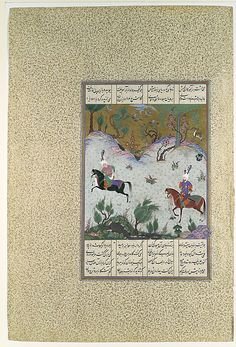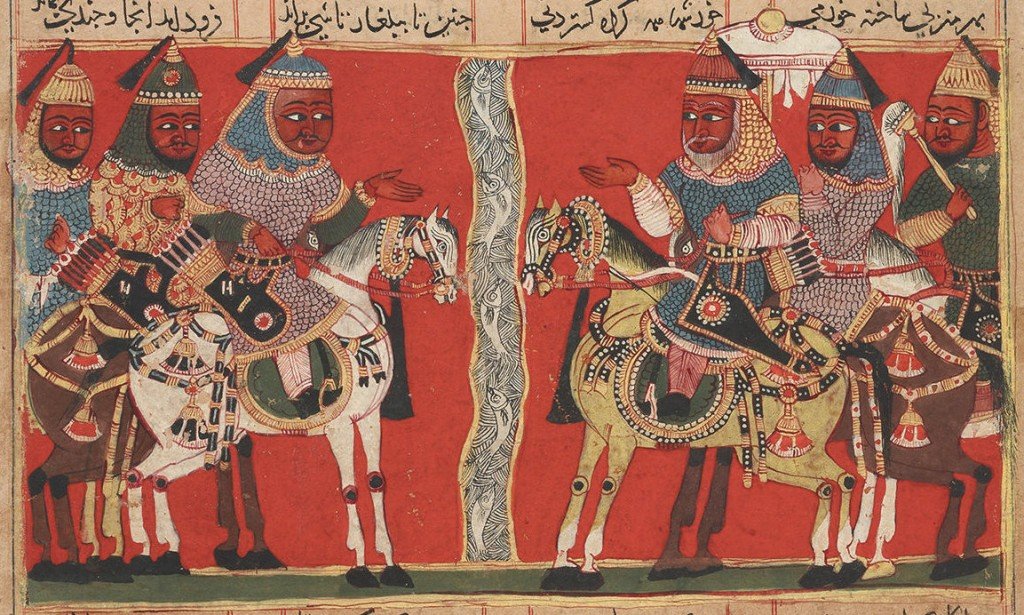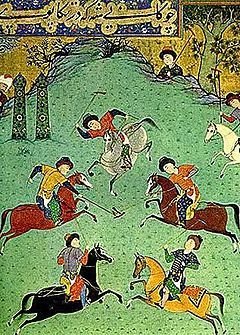Join Tessa Gratton and me as we read the Shahnameh by Abolqasem Ferdowsi. We’re using the Dick Davis translation (Penguin Classics).
If you haven’t already don’t forget to check out this AMAZING post by Rachel W in which she works out the complicated genealogy of our main and secondary characters.
This week: the first half of Rostam and Esfandyar.
Synopsis: “The Prince of Iran Esfandyar meets Rostam who has been living apart from the Persian court and the two engage in a ‘My Dick Is Bigger Than Yours’ contest”
TG: My feelings about this section are probably pretty clear based on my summary.
At one point they even *literally* have a handshake contest. In which they squeeze blood and pus out from under each other’s fingernails. (At least the narrative is ALL IN).
My two real issues with section are:
a) nobody listens to good advice
b) wtf motivations
Both Esfandyar’s mother Katayun and his advisor Pashutan give Esfandyar good advice multiple times, but he disregards them. His only counter-point is a good one, (that it’s bad news to go against the king’s command) but I’m not sure it out weighs the legions of reasons Katayun and Pashutan offer to disregard his father’s unreasonable command. What’s the point of having advisors if you never listen to them? Only Afrasyab regularly listened to his advisor, and of course his advisor was evil and led him astray again and again.
With Katayun, at least, I’m pretty sure Esfandyar only asked her because he thought she’d tell him what he wanted to hear. When she doesn’t, he treats her terribly and regrets asking her at all. When he says those mean things to her about asking a woman’s advice I think he’s making it up, since he’s all “some guy said this” instead of having an actual citation.
As for motivations…. I think it’s interesting that Esfandyar is so interested in inheriting the throne before his time, just like Goshtasp was and did, and I can’t help but wonder what we missed thematically in the skipped-over section that might have helped us understand the shift from heirs being named only when the king was near death to this legacy situation. Is it just that Lohrasp has a living son, who has a living son, instead of sons dying tragically? Is it a shift with the coming of Zoroaster? The desire to take the crown from your father doesn’t seem like something that should sit well with the presence of farr.
The other aspect of my wtf motivations reaction is that I have mixed feelings about the kind of narrative when prophecy causes its own conclusion: If Goshtasp hadn’t had his son’s astrological chart read, would any of this happened? And when he gets the prophecy, he only momentarily tries to figure out a way to thwart it. When the councilor says you can’t change fate Goshtasp seems to decide “well, if I can’t change my son’s fate of dying at Rostam’s hand, I guess I should just give in and create a TERRIBLE SCENARIO.”
side note: HOW DO YOU NOT RECOGNIZE ZAL???

Esfandyar, wearing lamellar armor and a lovely helm, and riding a splendid black horse, wields a sword as he hunts two gray wolves (one of which has ANTLERS) in a landscape of trees and bushes.
KE: Goodness. We have finally met a man who is as obnoxious and self centered as Rostam.
The first thing that strikes me on reading Rostam and Esfandyar (the first half) is that the dispute between Khosrow and Zal isn’t really over. Zal spoke out against Khosrow’s decision to leave the kingship, and while he apologized (in a beautiful gesture) for doubting the king’s appointment of Lohrasp as his heir, in fact it now seems that Rostam and Zal have not acknowledged Lohrasp’s heir in any meaningful way. That in part is what ignites this rather dreadful story.
Once again a mother gives advice to her son and is ignored, this time with bonus sexism about women’s advice. At first I thought Esfandyar was too young to have married but he has a grown son, so it’s interesting that none of his wives/concubines are deemed important enough to influence him. Again I can’t analyze because I don’t know the cultural context but it’s fascinating to me which of our famous men are given relationships with mothers, which with wives, and which basically have no female figure to interact with as adults.
The debates between the two men are amusing as they each strive to out-dick each other using courtly flowery language mixed with stabs of insults and demands. Also, I want to note that I wrote the previous sentence before I saw Tessa’s comments, just to note that we independently came to the conclusion that Esfandyar is a dick to rival Rostam.
I was also intrigued and puzzled by the son who wants to supplant his father, in contrast to the father who (in the case of Kavus, for example) steps aside when it is time for his son (or grandson) to take his place. It does feel as if a sea change has happened, or a cultural shift. As we haven’t reached Alexander the Great’s time yet I’m not sure if all of this still exists in the “legendary past” or if any of it has any correspondence to the Achaemenid era. It doesn’t seem to, but (according to the book I mentioned last week) it’s clear the Persians have had a tradition of “Books of Kings” from before the time of Alexander and maybe as far back as the Median kings who reigned prior to Cyrus and the Achaemenids.
The thing is: given Esfandyar’s history of wanting to supplant his father, why would Goshtasp even try to stop him from getting killed by Rostam? That absolves him from the crime of killing his own son or acting against him, and rids him of an heir who will never be satisfied until his father is dead.
Oh, and yes: The handshake scene is a classic piece of dick dueling. I am sure we should be more respectful of the deep masculine profundity in all this, but I just can’t.
Next week: The second half of this story will doubtless end badly for someone whose name is Esfandyar.
Previously: Introduction, The First Kings, The Demon King Zahhak, Feraydun and His Three Sons, The Story of Iraj, The Vengeance of Manuchehr, Sam & The Simorgh, The Tale of Zal and Rudabeh, Rostam, the Son of Zal-Dastan, The Beginning of the War Between Iran and Turan, Rostam and His Horse Rakhsh, Rostam and Kay Qobad, Kay Kavus’s War Against the Demons of Manzanderan, The Seven Trials of Rostam, The King of Hamaveran and His Daughter Sudabeh, The Tale of Sohrab, The Legend of Seyavash Pt. 1, The Legend of Seyavash Pt. 2, The Legend of Seyavash Pt. 3, Forud the Son of Seyavash, The Akvan Div, Bizhan and Manizheh, The Occultation of Kay Khosrow











